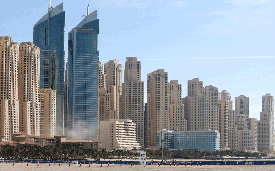
Tighter regulations in the housing market, rising inflation and a strong UAE currency will contribute to the further growth in Dubai housing prices, JLL said in its latest report.
Apartment sales prices in the year third quarter in Dubai fell by 3% compared with the previous quarter and by 11% year-on-year, whereas rental prices fluctuations during the year were not that pronounced. Rental prices in Dubai fell by only 1% both quarter-on-quarter and year-on-year, according to JLL experts.
House prices in the sales sector have also seen a decline in the third quarter of the year, although not as significant as apartment sale prices — just 3% quarter-on-quarter and 7% year-on-year. House rental prices in Dubai fell on average by 2% both quarter-on-quarter and year-on-year.
According to JLL analytics, rental sector has proved more resilient to price fluctuations due to several factors, which include also that tighter mortgage regulations and a doubling of a sales transactions fee made home ownership less affordable for many Dubai residents, leaving them only the possibility of renting.
As for the future, analysts' forecast is clear: "Prices are expected to continue softening over the remainder of the year and into 2016". A re-raise in prices should be expected only closer to the World Expo 2020 in Dubai, JLL said.
According to JLL estimates, the Dubai housing stock has increased by 1700 facilities over the last three months and now accounts for 452,000 housing units. However, some real estate projects originally scheduled for handover in the second half of 2015 have been held back until 2016-2017, so the expected effect of the massive one-time handover of a great number of new homes to the market won’t happen, the report said.







